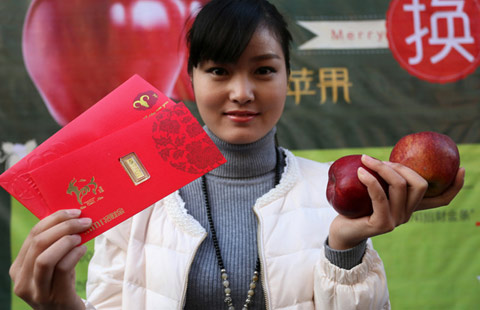UnionPay inches ahead of Visa, MasterCard in South Korea
By WU YIYAO (China Daily) Updated: 2014-12-25 08:51
 |
|
UnionPay banners on a shopping street in Seoul, South Korea. China UnionPay has issued more than 10 million cards in South Korea jointly with local credit card institutions.[Photo/Xinhua] |
China UnionPay has issued more than 10 million cards in South Korea jointly with local credit card institutions, a figure that makes UnionPay the top foreign card brand in the South Korean market.
According to UnionPay International Co, the international business arm of China UnionPay, transaction volumes using the UnionPay card in South Korea jumped from 17.4 percent of the country's total transactions using foreign cards in the third quarter of 2011 to 59.9 percent in the third quarter of 2014.
UnionPay is overtaking the United States-based card issuers MasterCard Inc and Visa Inc, reported ThinkPool Co Ltd, a provider of independent investment research in South Korea.
The booming volume of transactions in South Korea using UnionPay cards reflects the rise in Chinese visitors and an expansion of the network of merchants accepting the card, said Bomee Sheng, chief representative of UnionPay International's branch in South Korea.
Sheng said the increasing number of cardholders and their "rocketing" purchasing power have given UnionPay more bargaining power when developing overseas network.
"Another reason for our fast growth is that we do not get involved in competition with local market players. We cooperate with local bankcard associations, banks and merchants," said Sheng.
In South Korea, UnionPay International issues cards jointly with BCcard Co Ltd, the country's largest credit card issuer, which has 11 member banks.
UnionPay aims to become an international card issuer that will serve overseas local markets in addition to serving Chinese cardholders, Cai Jianbo, president and CEO of UnionPay International, said recently.
UnionPay international will also help some countries develop their own bankcard payment systems, according to UnionPay International. For example, UnionPay will help build the bankcard payment system in Laos starting in 2015.
Analysts said that as China further opens up the bankcard clearing market in 2015, competition will heat up in the payment sector.
"For financial institutions, payment means much more than just delivering money from one party to another.
"Payment processes actually carry data involving the credit of the cardholders and their consumption habits and purchasing power, and this information can leverage more resources for financial institutions," said Ma Ning, an analyst with the Goldman Sachs Group Inc.
Payments completed through smartphone applications and via the Internet have taken a larger market share than ever.
But traditional payment methods, including swiping bankcards at point-of-sale terminals, remain the mainstream for their safety and convenience, said Yang Minji, a Shanghai-based analyst with Fulun Consultancy.
- UnionPay inches ahead of Visa, MasterCard in South Korea
- GM imports may reduce corn prices
- Private bank trial poised for expansion during 2015
- Toy factories face fight for survival
- Smartphone sales growth predicted to slide
- Samsung calls in experts to halt flagging numbers
- Top 10 fitness trackers ranked by price
- Full steam ahead for cruise industry

















